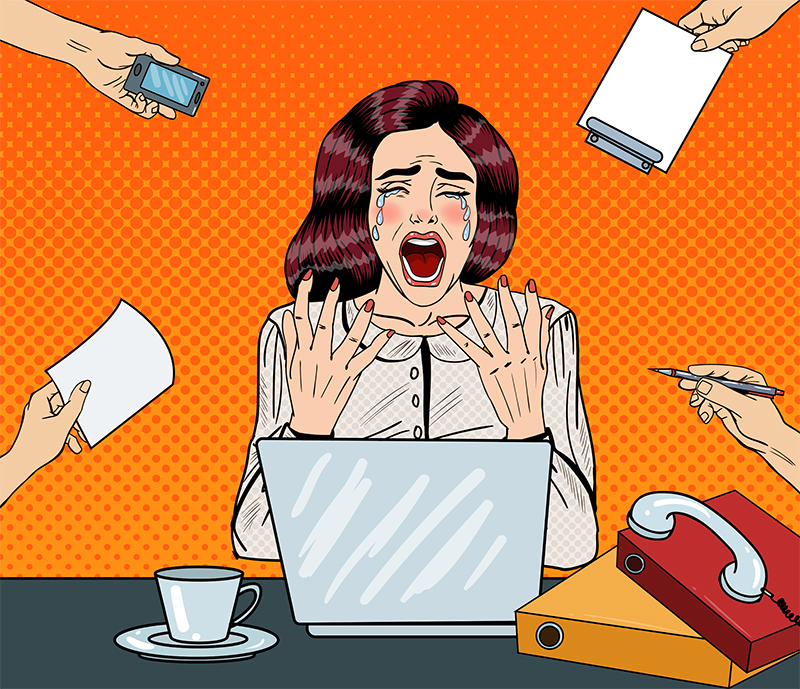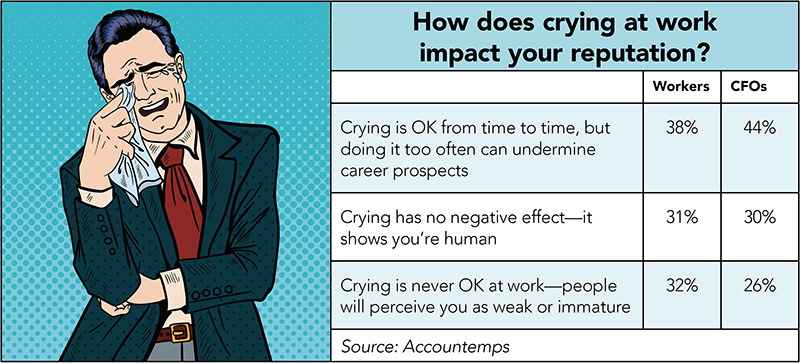
Frankie Valli sang “Big Girls Don’t Cry” and Tim McGraw extolled “Grown Men Don’t Cry,” but according to a recent survey from Accountemps, they’re both wrong. Boy are they wrong.
More than four in 10 workers (45 percent) have admitted to crying at work, according to the survey of more than 1,000 U.S. workers age 18 and older who work in an office environment. About the same proportion of CFOs (44 percent) say shedding tears is acceptable as long as it’s not an everyday occurrence. (Accountemps surveyed more than 2,200 CFOs from a random sample of companies in more than 20 of the largest U.S. metropolitan areas.)
Workers were evenly split as to whether crying in the office hurts your reputation while executives were more forgiving with 26 percent of CFOs saying crying is never acceptable at the office (versus 32 percent of workers). Still, that means a quarter of executives and a third of workers frown on crying at work, even though just under half of workers admit to doing it.
Among the survey’s other findings are:
• Baby boomers are more likely to think crying doesn’t affect one’s reputation (43 percent) than Gen Xers (31 percent) and millennials (25 percent).
• More than half of employees (52 percent) have lost their temper on the job.
• Of those who admitted to showing their anger, 65 percent directed their emotional outburst toward a colleague while 37 percent aimed it at their manager.
“Emotions run high. The economic environment in the last five to seven years has changed. We went through a recession and people got jobs put on their plates that two or three [workers] would typically do,” says Barry Roy, regional vice president of northern New England for Accountemps, a national staffing agency. “People are overwhelmed and have too many projects. There’s a lot of pressure these days.”
And even though the economy is doing well, the pressure isn’t being alleviated as companies are growing but having difficulty finding enough new staff to meet their needs. “People spend more time at work than at home and with their families. Emotions can get the best of us,” Roy says. “At the end of day, we are all human.”

What Managers Need to Consider
If an employee bursts into tears at work, managers need to get at the root of what is upsetting the employee. If it is related to work, managers should dig deeper, but if it is a personal problem, managers should tread carefully and not get personally involved as it could lead to legal trouble for the company.
Instead, experts say a manager should refer an employee to an HR professional or an Employee Assistance Program (EAP) if it has one. “You can get yourself in trouble by taking on more responsibility than you should. Point them to resources,” says Amy Cann, founder and senior consultant of Human Resources ROI, an HR consulting firm in Portsmouth.
If the company does not have an EAP, managers can also refer employees to NH’s 211 information system for state resources, which can connect them with state agencies, nonprofits and private agencies that can help them, Cann says.
The first step, though, is to have a conversation and figure out what is bothering the employee. “Really understanding what is behind the emotion is important. Is it work related or personal? If it’s personal, encourage them to take a break, take a walk or take the afternoon,” says Michelle Gray, president of HR Synergy, LLC, an HR consulting firm in Bedford. “If it involves the workplace, that’s a different story. Why are they upset about their work? They could have transitioned to a new position and feel overwhelmed. It could be harassment or bullying.”
If the employee is having a tough time, Cann says simply listening can be a big help. “We really underestimate how powerful listening is and showing some empathy,” she says. Managers should start the conversation by simply asking how they can help, says Tonya Rochette, partner and vice president of Human Resource Partners, LLC, an HR firm with offices in Concord and Dover.
If a manager is having a difficult conversation about performance with an employee who begins to cry, take a break—such as a bathroom or coffee break—and allow the employee to absorb the information privately and to regain their composure, Gray says.
However, don’t be tempted to suspend the meeting to another day, says Cann. “It can be a technique to elicit sympathy and lessen impact,” she says. Cann advises managers to remain firm. “In a discipline counseling meeting, crying doesn’t change the problem being addressed. You need to stay firm. Use a minute to allow them to collect themselves, but reinforce the importance of the meeting and keep going,” she says.
After an employee has had an emotional episode, a manager should check in with the employee once they have taken time to collect themselves and make sure the employee is doing well, Gray suggests. “We want to know our manager cares,” Gray says. “You’re not looking for details, just to make sure they are okay. That settles employees. They know you understand.”
Rochette adds managers would benefit from being coached on how to be open and respectful with an employee who is having an emotional response. “A manager’s responsibility is to make sure the employee has all the tools and supports to be successful, including emotional support,” she says.
What Employees Should Consider
While experts agree that everyone is human and that crying should not affect an employee’s job, the reality is a manager or co-workers may view them differently.
“Employees should not face repercussions from crying,” Gray says. “We’re all human. I would hope there is a culture forgiving of that.”
However, Cann says there are many people who still associate crying with weakness. “It’s something you often can’t afford in your career,” she says. “I’ve cried at work out of frustration, and it made me appear weaker, and I had to work harder to regain trust and confidence.”
Cann says anger is another strong emotion that can hurt you at work. “People can interpret if you cry, you’re weak or if you’re angry, you will fly off the handle or can’t handle stress. It goes back to potentially harming your career,” she says.
Cann suggests if people start to feel emotional, they can say, “This is important to me, and I need a moment. You can acknowledge feeling frustrated and the need to take a walk, or the need for a moment.”
Gray recommends that after an emotional outburst, the employee circle back to that person and own that moment and explain, “I know this had nothing to do with you. I have it under control.”
“It’s about learning to manage yourself in the workplace,” Rochette says. “Crying is not a bad thing. It shows you care about something.” And, at the end of the day, employees should be judged by their output and not by a moment, Rochette says.
